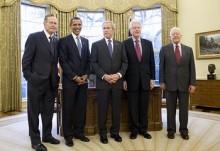News
Commemorating the Armenian genocide:Past, present, and future
24.04.2012

During World War I, the world witnessed the first genocide of the twentieth century. From 1915 to 1918, 1.5 million Armenians (approximately 50 percent of the Armenian population at that time), along with other minorities living in the Ottoman Empire, were systematically killed by the Ottoman Turks. The Armenian Genocide is commemorated on April 24; it was on this day in 1915 that the Young Turks, the ruling party of the Ottoman Empire, ordered the killing of Armenian intellectuals, leaders, artists, and businessmen living in the Ottoman Empire. Following this day, many Armenian men were massacred and plans for the genocide were implemented.
In the three years since, Armenian men, women, and children were deported to Deir ez-Zor desert in Syria and made to march in extreme conditions. Many died en route and many more were killed by Turkish military men enforcing the march. Even after journalists and diplomats, such as Henry Morgenthau, called for help for the Armenians, countries like Great Britain and the United States failed to respond effectively.
Within the MIT community, students of Armenian descent, both at the undergraduate and graduate level, remember the tragic losses of their ancestors. The ancestors of one of our fellow students were among the Armenians that experienced the Genocide first-hand. After witnessing the murder of their family and friends, they escaped to Syria. Throughout the years, his ancestors have passed down the story of this terrible crime committed against the Armenian people. "Armenpress" reports, citing The Tech.
To this day, the Turkish Government has made no apology or historical admittance of the Armenian Genocide. Many Turkish historians claim that there was no Genocide, but rather that the killings were simply the outcome of battles between Armenians and Turks during WWI. However, a trend has developed towards more open dialogue about the Armenian Genocide by Turkish society, albeit a slow one. For example, Professor Taner Akçam of Clark University is the first scholar of Turkish descent who has publicly recognized the Armenian Genocide and has written several books on the topic including The Young Turks’ Crime Against Humanity: The Armenian Genocide and Ethnic Cleansing in the Ottoman Empire, and A Shameful Act: Armenian Genocide and the Question of Turkish Responsibility.
Today, the American government does not recognize the Armenian Genocide. President after president has made extensive promises to officially have the US government recognize the Armenian Genocide. However, no president has remained true to his word. Among these presidents are President Clinton, President Bush, and President Obama. However the list of countries that have recognized the Genocide are growing, and include France, Canada, Argentina, Germany, Italy, Uruguay, and many others.
